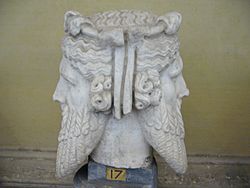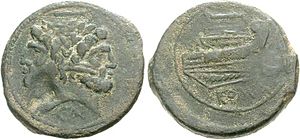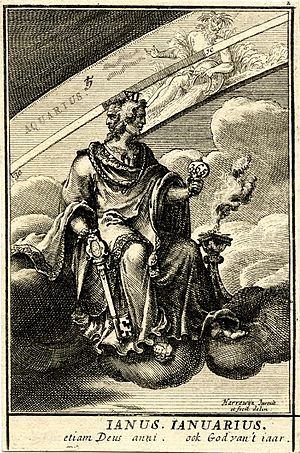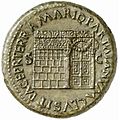Janus facts for kids
Quick facts for kids JanusIANVS |
|
|---|---|
 |
|
| Etruscan equivalent | Culśanś |
Janus was a two-faced god of Roman mythology who kept the gate of Heaven. He was the god of beginnings and ends, and so of gates, doors, doorways and passages. He is usually depicted as having two faces, since he looks to the future and to the past. The Romans named the month of January (Ianuarius) in his honor. In January we look back on the last year and forward to the next.
Janus presided over the beginning and ending of conflict, and hence war and peace. The doors of his temple were open in time of war, and closed to mark the peace. As a god of transitions, he was remembered at births, and journeys: he was concerned with travelling, trading and shipping. An unusual feature of the mythology is that the ancient Greeks had no version of Janus.
Contents
Origin, legends, and history
Janus was considered by Romans the first king of Latium, sometimes along with Camese. He would have received hospitably the god Saturn, who, expelled from Heaven by Jupiter, arrived on a ship to the Janiculum. Janus would have also effected the miracle of turning the waters of the spring at the foot of the Viminal from cold to scorching hot to fend off the assault of the Sabines of king Titus Tatius, come to avenge the kidnapping of their daughters by the Romans.
His temple named Janus Geminus was said to have been built by king Numa Pompilius, who kept it always shut during his reign as there were no wars. After him it was closed very few times, one after the end of the first Punic War, three times under Augustus and once by Nero. It is recorded that emperor Gordianus III opened the Janus Geminus.
Symbols
Janus was the protector of doors, gates and roadways in general, as is shown by his two symbols, the key and the staff. The key too was a sign that the traveller had come to a harbour or ford in peace to exchange his goods.
God of change
Janus frequently symbolized change and transitions such as the progress of past to future, from one condition to another, from one vision to another, and young people's growth to adulthood. He represented time because he could see into the past with one face and into the future with the other. Hence, Janus was worshipped at the beginnings of the harvest and planting times, as well as at marriages, deaths and other beginnings. He represented the middle ground between barbarism and civilization, rural and urban space, youth and adulthood.
Rites
The rites concerning Janus were numerous. Apart from the rites celebrating the beginning of the new year and of every month, there were the special times of the year which marked the beginning and closing of the military season, in March and October respectively.
Any rite or religious act whatsoever required the invocation of Janus first.
Although Janus had no flamen, he was closely associated with the rex sacrorum who performed his sacrifices and took part in most of his rites: the rex held the first place in the ordo sacerdotum, hierarchy of priests. The flamen of Portunus performed the ritual greasing of the spear of the god Quirinus on 17 August, day of the Portunalia, on the same date that the temple of Janus in the Forum Holitorium had been consecrated by consul Gaius Duilius in 260 BC.
Beginning of the year
The winter solstice was thought to occur on 25 December. On 1 January was New Year's Day: the day was consecrated to Janus since it was the first of the new year and of the month (kalends) of Janus. Thus on that day it was customary to exchange cheerful words of good wishes. For the same reason everybody devoted a short time to his usual business, exchanged dates, figs and honey as a token of well wishing and made gifts of coins called strenae. Cakes made of spelt (far) and salt were offered to the god and burnt on the altar. Ovid states that in most ancient times there were no animal sacrifices and gods were propitiated with offerings of spelt and pure salt.
Images for kids
-
The temple of Janus with closed doors, on a sestertius issued under Nero in 66 AD from the mint at Lugdunum
-
The traditional ascription of the "Temple of Janus" at Autun, Burgundy, is disputed.
See also
 In Spanish: Jano para niños
In Spanish: Jano para niños






